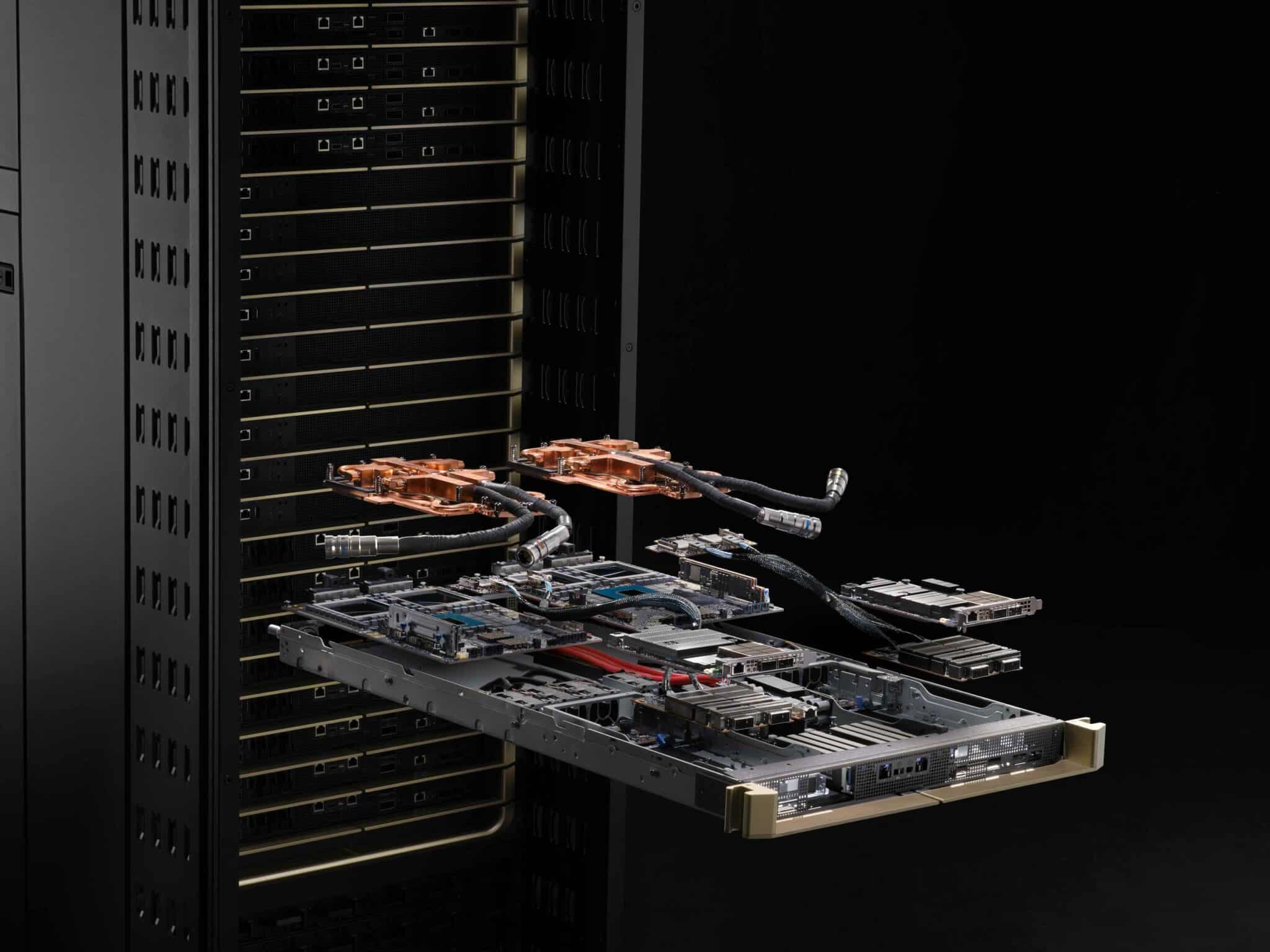A deep know-how convention for processor and system architects from trade and academia has turn out to be a key discussion board for the trillion-dollar knowledge middle computing market.
At Sizzling Chips 2024 subsequent week, senior NVIDIA engineers will current the most recent developments powering the NVIDIA Blackwell platform, plus analysis on liquid cooling for knowledge facilities and AI brokers for chip design.
They’ll share how:
- NVIDIA Blackwell brings collectively a number of chips, programs and NVIDIA CUDA software program to energy the subsequent technology of AI throughout use instances, industries and international locations.
- NVIDIA GB200 NVL72 — a multi-node, liquid-cooled, rack-scale resolution that connects 72 Blackwell GPUs and 36 Grace CPUs — raises the bar for AI system design.
- NVLink interconnect know-how gives all-to-all GPU communication, enabling file excessive throughput and low-latency inference for generative AI.
- The NVIDIA Quasar Quantization System pushes the boundaries of physics to speed up AI computing.
- NVIDIA researchers are constructing AI fashions that assist construct processors for AI.
An NVIDIA Blackwell speak, going down Monday, Aug. 26, may even highlight new architectural particulars and examples of generative AI fashions working on Blackwell silicon.
It’s preceded by three tutorials on Sunday, Aug. 25, that can cowl how hybrid liquid-cooling options may also help knowledge facilities transition to extra energy-efficient infrastructure and the way AI fashions, together with giant language mannequin (LLM)-powered brokers, may also help engineers design the subsequent technology of processors.
Collectively, these displays showcase the methods NVIDIA engineers are innovating throughout each space of knowledge middle computing and design to ship unprecedented efficiency, effectivity and optimization.
Be Prepared for Blackwell
NVIDIA Blackwell is the final word full-stack computing problem. It includes a number of NVIDIA chips, together with the Blackwell GPU, Grace CPU, BlueField knowledge processing unit, ConnectX community interface card, NVLink Change, Spectrum Ethernet change and Quantum InfiniBand change.

Ajay Tirumala and Raymond Wong, administrators of structure at NVIDIA, will present a primary take a look at the platform and clarify how these applied sciences work collectively to ship a brand new commonplace for AI and accelerated computing efficiency whereas advancing power effectivity.
The multi-node NVIDIA GB200 NVL72 resolution is an ideal instance. LLM inference requires low-latency, high-throughput token technology. GB200 NVL72 acts as a unified system to ship as much as 30x quicker inference for LLM workloads, unlocking the flexibility to run trillion-parameter fashions in actual time.
Tirumala and Wong may even talk about how the NVIDIA Quasar Quantization System — which brings collectively algorithmic improvements, NVIDIA software program libraries and instruments, and Blackwell’s second-generation Transformer Engine — helps excessive accuracy on low-precision fashions, highlighting examples utilizing LLMs and visible generative AI.
Preserving Knowledge Facilities Cool
The normal hum of air-cooled knowledge facilities could turn out to be a relic of the previous as researchers develop extra environment friendly and sustainable options that use hybrid cooling, a mixture of air and liquid cooling.
Liquid-cooling strategies transfer warmth away from programs extra effectively than air, making it simpler for computing programs to remain cool even whereas processing giant workloads. The gear for liquid cooling additionally takes up much less house and consumes much less energy than air-cooling programs, permitting knowledge facilities so as to add extra server racks — and subsequently extra compute energy — of their services.
Ali Heydari, director of knowledge middle cooling and infrastructure at NVIDIA, will current a number of designs for hybrid-cooled knowledge facilities.
Some designs retrofit present air-cooled knowledge facilities with liquid-cooling items, providing a fast and straightforward resolution so as to add liquid-cooling capabilities to present racks. Different designs require the set up of piping for direct-to-chip liquid cooling utilizing cooling distribution items or by totally submerging servers in immersion cooling tanks. Though these choices demand a bigger upfront funding, they result in substantial financial savings in each power consumption and operational prices.
Heydari may even share his crew’s work as a part of COOLERCHIPS, a U.S. Division of Vitality program to develop superior knowledge middle cooling applied sciences. As a part of the challenge, the crew is utilizing the NVIDIA Omniverse platform to create physics-informed digital twins that can assist them mannequin power consumption and cooling effectivity to optimize their knowledge middle designs.
AI Brokers Chip In for Processor Design
Semiconductor design is a mammoth problem at microscopic scale. Engineers creating cutting-edge processors work to suit as a lot computing energy as they’ll onto a chunk of silicon just a few inches throughout, testing the boundaries of what’s bodily doable.
AI fashions are supporting their work by enhancing design high quality and productiveness, boosting the effectivity of handbook processes and automating some time-consuming duties. The fashions embrace prediction and optimization instruments to assist engineers quickly analyze and enhance designs, in addition to LLMs that may help engineers with answering questions, producing code, debugging design issues and extra.
Mark Ren, director of design automation analysis at NVIDIA, will present an outline of those fashions and their makes use of in a tutorial. In a second session, he’ll deal with agent-based AI programs for chip design.
AI brokers powered by LLMs will be directed to finish duties autonomously, unlocking broad purposes throughout industries. In microprocessor design, NVIDIA researchers are creating agent-based programs that may purpose and take motion utilizing personalized circuit design instruments, work together with skilled designers, and be taught from a database of human and agent experiences.
NVIDIA specialists aren’t simply constructing this know-how — they’re utilizing it. Ren will share examples of how engineers can use AI brokers for timing report evaluation, cell cluster optimization processes and code technology. The cell cluster optimization work not too long ago gained finest paper on the first IEEE Worldwide Workshop on LLM-Aided Design.
Register for Sizzling Chips, going down Aug. 25-27, at Stanford College and on-line.
